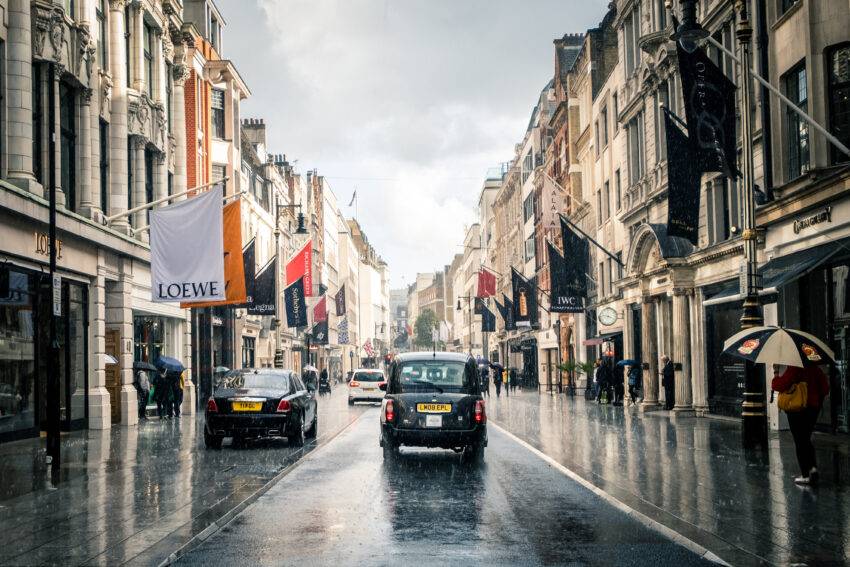Retail sales growth cooled sharply last month as households tightened budgets ahead of Chancellor Rachel Reeves’s November Budget and heavy storms kept shoppers off the high street.
Figures from the British Retail Consortium (BRC) and KPMG show retail sales rose 2.3% year on year in the five weeks to October 4, down from 3.1% in the previous period. Although still above the 12-month average of 2.1%, the slowdown underscores weakening consumer confidence heading into the key Christmas trading season.
The BRC said speculation about a fresh round of tax rises had depressed consumer sentiment, while Storm Amy, which brought days of wind and rain across Scotland and northern England, further dented footfall.
Helen Dickinson, BRC Chief Executive, warned: “Rising inflation and a potentially taxing Budget is weighing on the minds of many households planning their Christmas spending.”
A separate BRC report this month suggested heavy rainfall may have played an even larger role than Budget anxieties in depressing sales, with many high streets and retail parks reporting double-digit footfall declines during early October.
The sector faces mounting concern that households will cut back over the festive period — traditionally the “golden quarter” when retailers earn the bulk of annual profits.
Inflation has remained stubbornly high at 3.8%, the strongest level in 19 months, while food inflation stands at 5.1%, its highest rate since January 2024. That has squeezed disposable income and curbed appetite for discretionary purchases.
The BRC said food sales rose 4.3% year on year in the five-week period, down from 4.7%, with growth driven largely by price increases rather than higher volumes.
Non-food sales — covering clothing, homeware and technology — grew by just 0.7%, compared with 1.8% in the previous month. Electronics sales bucked the trend, boosted by the release of Apple’s iPhone 17 and new Apple Watch, but demand for apparel and household goods remained subdued.
“Consumers are trading down, prioritising essentials and cutting back on larger purchases,” Dickinson said. “The Christmas period will be a critical test of confidence.”
Reeves is preparing a November 26 Budget expected to include up to £40 billion in tax rises, roughly matching the scale of her first Budget last year. The Chancellor is reportedly seeking to rebuild fiscal headroom eroded by weak growth and higher debt servicing costs.
Retailers remain wary after Reeves’s October 2024 Budget, which raised employers’ National Insurance contributions by £25 billion — a move that hit labour-intensive industries such as retail and hospitality particularly hard.
Since then, the UK has shed about 150,000 payroll jobs, according to HMRC, with most losses concentrated in consumer-facing sectors already struggling with rising minimum wage costs and declining footfall.
Separate data from Barclays revealed that overall retail spending fell 0.7% in September, led by a sharp decline in non-essential purchases. Spending on public transport fell 2.6%, the steepest drop since the 2021 lockdown, due largely to strikes on London’s Tube network.
One-third of Londoners told Barclays they had cut their overall monthly spending as a result of transport disruption.
Still, some categories bucked the slowdown. Spending on health, beauty and small luxury items jumped 9%, reflecting the so-called “lipstick effect” — when consumers seek affordable indulgences during periods of economic stress.
Economists warn that retailers could face a subdued Christmas, as lingering inflation and uncertainty over tax policy sap household confidence.
“With inflation sticky and the Budget looming, consumers are unlikely to loosen their purse strings until they know what’s coming,” said one retail analyst.
The BRC said the sector was bracing for a tough fourth quarter but remained cautiously optimistic that early promotional activity and online sales events such as Black Friday could offer some relief.
“Retailers are doing everything possible to deliver value for money and encourage festive spending,” Dickinson said. “But it’s clear that both the weather and the wider economic climate are weighing heavily on the nation’s tills.”


